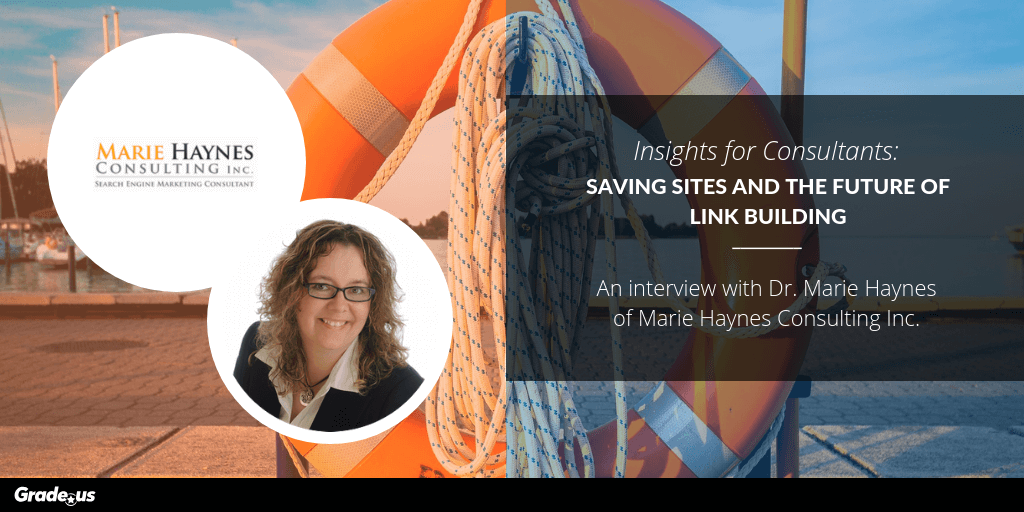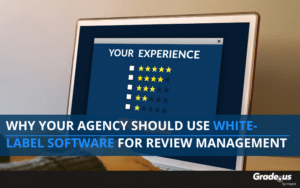Who you gonna call when your traffic drops?
If your answer is Google penalty expert and algorithm analyst Marie Haynes of Marie Haynes Consulting Inc., you'd probably be making a great choice.
For years, Marie has been a go-to for websites in crisis.
She's been featured on Forbes, Moz, Search Engine Roundtable, Search Engine Watch, WebProNews, TheSEMPost, Search Engine Journal, and Search Engine Land.
She graciously agreed to an interview with Grade.us as well, and she had a ton of insights to share about Google's ever-shifting algorithm, as well as some updates she expects Google to make in the future.
Some of what she had to say may surprise you! Read the old school style phone conversation that Marie and I shared about web site rescues and link building.
Carmen: So what's your favorite type of SEO client, and why?
Marie: Pretty much everything we're doing right now is working with sites with traffic drops. Our clients are super varied, from small "Mom and Pop" shops to brands everyone would recognize.
When we take on a client we want to know why the site dropped and what Google changed in their algorithm.
We like working with sites known as good brands who are doing a lot of things wrong on their website. They're good stories for us. If we can get the word out they're an authority in their space, often, we can get them ranking better.
Carmen: As an agency, how do you pitch clients SEO services and address the need to undersell, yet overdeliver, on your value proposition?
Marie: Our business is probably different from most of the SEO companies you talk to. We have a cool problem in that we have more business than we can handle right now. We don't spend any time on sales. Our own sales page on our web page is not up to date because we have a waiting list.
I do interviews like this one, speak at conferences, write articles, and spend a lot of time on Twitter. The business just seems to come from that. As people do their own research on traffic drops they come across one of my articles or interviews, then reach out to hire us.
Carmen: How do you explain significant traffic changes to clients?
Marie: Most of the time the reason is Google made changes to its algorithm.
In the past, these changes would be connected to technical things. We could say things like, "Oh, you don't have your canonical tags working appropriately," or, "You have tons of duplicate content." Stuff like that.
Now?
I personally believe everything Google is doing in changing their algorithm is connected to the Quality Rater's Guidelines.
2 minutes before you called, Danny Sullivan from Google just tweeted something about the latest algorithm update. It was connected to the Quality Rater's Guidelines.
Everything you need is in there.
We address any site in the eyes of the Guidelines. We still look at technical stuff like link quality, and competitors, but the vast majority of the reports are based off that.
Carmen: So what do you do to calm your clients when they're freaking out over a traffic drop?
Marie: I don't know if we do anything specific to calm them down.
But one thing I find a lot of SEOs do is promise things they can't deliver on. We tell everyone,
"We can't promise you're going to rank better. This might be the way things are."
Some sites may only have ranked in the past because they found ways to trick Google. Purchased links. Joined a private blog network. In cases like that, it's really hard to recover.
One thing we do is just show them some examples of similar sites where we've been able to help the client, but I think it's really important not to promise the moon.
We take our best guess. "We think Google thinks this is high quality, and you're lacking that, so let's change that." But in some cases recovery really isn't possible. It's challenging for sure!
Carmen: What's changed about the SEO industry since you joined?
Marie: I think Google is getting really good at figuring out which links to count.
In the past, you could take pretty much any business, and if you had enough budget to purchase links or get links in places where you had to know people to get those links, you could take almost any business and help them rank better.
But ever since Penguin 4.0 in September of 2016, they just figured out they wanted to count trustworthy links. They're getting better and better at figuring out which links to count.
Another factor is trust. Google is trying to figure out, "Which business do people trust?"
They don't want to rank a business that has issues which might make them untrustworthy. Things like negative reviews tend to speak to a lack of trust. Things like a bad BBB profile, or ranking. Things like ads that deceive people to get them to click.
Sites that use things like that or have those issues tend to see drops with algorithm updates these days.
Carmen: Google constantly updates the value they place on link building and different types of links, as you said. What are the three best link strategies you recommend, and how do you recommend local SEO specialists help their clients with them?
Marie: I still think there's a place for link building, but the vast majority of links you can get easily are probably the ones I think Google is ignoring.
Most of my efforts, if I was doing link building, would be focused on traditional PR. Doing things that produce buzz. Producing content people legitimately would want to link to.
The links Google counts are the ones people want to click on.
If you're getting links, but nobody's going to read the content, there's a good chance those links are not going to help your rankings.
Carmen: So you don't do link building anymore?
Marie: We don't offer link building right now. We're almost completely doing site quality reviews, some link audits as well. We also don't have ongoing monthly clients.
Carmen: So you sort of shape them up and ship them out?
Marie: Yes. We have one case where we grew them 400%, made tons of money for them.
We didn't build a single link for the site.
We just improved the user experience, tweaked the on-page content, and ensured the experience the site delivered was better than the competitor's.
There's a place for link building, but it really is a waste of time.
Carmen: What are your favorite resources for professional education, and who are the best industry experts to follow?
Marie: Barry S. at Search Engine Roundtable to stay on top of the latest news. Everyone interested in SEO should be following Google Search Liaison. Their Twitter handle is @searchliaison. That's Danny Sullivan. Every now and then he'll tweet out things about algorithm updates, stuff like that.
My team and I also put out a newsletter, [Search News You Can Use], once a week, and we spend probably 20-30 hours a week just staying on top of any news in SEO, any new case studies, any interesting discussions, things like that.
Carmen: What role do you think online reviews play in Local SEO? Do you see reviews playing a larger or smaller role in the future?
Marie: Definitely larger.
In the Quality Reader's Guidelines there's all sorts of stuff about reviews.
Reviews are mentioned 72 times in the Quality Reader's Guidelines. They instruct quality raters to look at:
"Does the business have an overwhelmingly negative review profile?"
What Google's trying to look at is if everyone is complaining about bad customer service or an inability to get a refund then they don't want to rate them well. Google tells their raters to look at Yelp, BBB, and Amazon, not just Google reviews. I think these are being factored into the algorithm for sure.
Carmen: What's your best advice for SEO consultants who are just starting out?
Marie: One of the best things I'd recommend is to create or get a website, and try to rank it.
I see so many people who know the theory of SEO, but they've never actually ranked a website. So they're going off other people's advice and experiences.
You can do so much by building your own website.
See if you can find businesses that need help but that don't have the budget.
When I was just starting out I helped some friends for free and took on some jobs for very little pay just to see if I could successfully rank those sites. Then I asked them for a testimonial and demonstrated I'd done some good stuff.
Provided these people know you're just starting out, that could be a good place.
And then I think another good place to learn is The Local Search Forum. It's a really good place where there's people who do local search day in and day out. They're very happy to answer questions in there, that's a great place to learn as well.
Carmen: What's your underrated "psychic" prediction for the future of SEO in 2019?
Marie: I think Google will continue to get better at ignoring links.
We're going to see a shift away from link building and towards authenticity, if that makes sense.
So, what I think is going to happen is Google is going to find ways to rank sites based on factors that aren't links. I don't think they're going to go away completely, but I think they'll be less and less important.
Carmen: Definitely an important thing to watch! Thanks so much for joining us today, Marie.
Marie: You're welcome!
Got thoughts on the future of links, or upcoming algorithm changes from Google? Let us know in the comments below!
About the Author
Raney C. Hudson
Raney C. Hudson is an independent content consultant with a 10+ year track record in the digital marketing industry.








